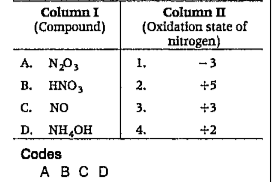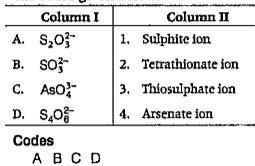Match column I with column II and select the correct option from the codes given below.
Column IColumn IISponge(i)TuberYeast(ii)OffsetPotato(iii)GemmulesWater hyacinth(iv)Budding
A-(iv), B-(i), C-(ii),D-(iii)
A-(iii), B-(i), C-(iv),D-(ii)
A-(iii),B-(iv), C-(i),D-(ii)
A-(iv),B-(ii),C-(i),D-(iii)
The correct Answer is:C
To solve the matching question between Column I and Column II, we will analyze each item in Column I and find its corresponding match in Column II based on the type of asexual reproduction they exhibit.
1. Identify the first item in Column I: Sponge
- Sponges reproduce asexually through a process called gemmulation, where they form internal buds known as gemmules.
- Match: Sponge → Gemmules (iii)
2. Identify the second item in Column I: Yeast
- Yeast reproduces asexually through budding, where a new organism develops from an outgrowth or bud on the parent organism.
- Match: Yeast → Budding (iv)
3. Identify the third item in Column I: Potato
- Potatoes reproduce asexually through tubers, which are swollen underground stems that can give rise to new plants.
- Match: Potato → Tuber (i)
4. Identify the fourth item in Column I: Water hyacinth
- Water hyacinth reproduces asexually by producing offsets, which are small daughter plants that grow from the mother plant.
- Match: Water hyacinth → Offset (ii)
Final Matches:
- Sponge → Gemmules (iii)
- Yeast → Budding (iv)
- Potato → Tuber (i)
- Water hyacinth → Offset (ii)
Conclusion:
The correct matches are:
- (Sponge, iii)
- (Yeast, iv)
- (Potato, i)
- (Water hyacinth, ii)
Thus, the correct answer is C.
- Sponges reproduce asexually through a process called gemmulation, where they form internal buds known as gemmules.
- Match: Sponge → Gemmules (iii)
- Yeast reproduces asexually through budding, where a new organism develops from an outgrowth or bud on the parent organism.
- Match: Yeast → Budding (iv)
- Potatoes reproduce asexually through tubers, which are swollen underground stems that can give rise to new plants.
- Match: Potato → Tuber (i)
- Water hyacinth reproduces asexually by producing offsets, which are small daughter plants that grow from the mother plant.
- Match: Water hyacinth → Offset (ii)
- Sponge → Gemmules (iii)
- Yeast → Budding (iv)
- Potato → Tuber (i)
- Water hyacinth → Offset (ii)
The correct matches are:
- (Sponge, iii)
- (Yeast, iv)
- (Potato, i)
- (Water hyacinth, ii)
Topper's Solved these Questions
Similar Questions
Knowledge Check
Match the column I with column II and select the correct option from the codes given below.
 AA - (i), B - (ii), C-(iii), D - (iv)BA - (iv), B - (i), C-(ii), D- (iii)CA - (iv), B - (iii), C-(ii), D- (i)DA - (iii), B - (iv), C-(i), D - (ii)
AA - (i), B - (ii), C-(iii), D - (iv)BA - (iv), B - (i), C-(ii), D- (iii)CA - (iv), B - (iii), C-(ii), D- (i)DA - (iii), B - (iv), C-(i), D - (ii)Match the column I with column II and select the correct option from the codes given below.
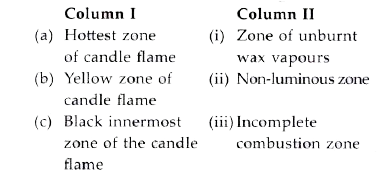 AA - (i), B - (ii), C-(iii), D - (iv)BA - (iv), B - (i), C-(ii), D- (iii)CA - (iv), B - (iii), C-(ii), D- (i)DA - (iii), B - (iv), C-(i), D - (ii)
AA - (i), B - (ii), C-(iii), D - (iv)BA - (iv), B - (i), C-(ii), D- (iii)CA - (iv), B - (iii), C-(ii), D- (i)DA - (iii), B - (iv), C-(i), D - (ii)Match the column I with column II and select the correct option from the codes given below
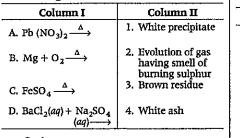 AA - (i), B - (ii), C-(iii), D - (iv)BA - (iv), B - (i), C-(ii), D- (iii)CA - (iv), B - (iii), C-(ii), D- (i)DA - (iii), B - (iv), C-(i), D - (ii)
AA - (i), B - (ii), C-(iii), D - (iv)BA - (iv), B - (i), C-(ii), D- (iii)CA - (iv), B - (iii), C-(ii), D- (i)DA - (iii), B - (iv), C-(i), D - (ii)
Match the column I with column II and select the correct option from the codes given below
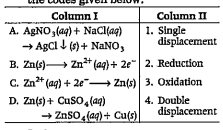
View SolutionMatch the column I with column II and select the correct option from the codes given below
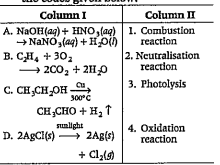
View SolutionMatch Column-I with Column-II and select the correct option from the codes gives below

View SolutionMatch the columns-I with column II and select the correct option from the codes given below.
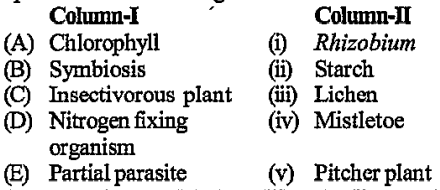
View SolutionMatch the column-I with column-II and select the correct option from the codes given below.
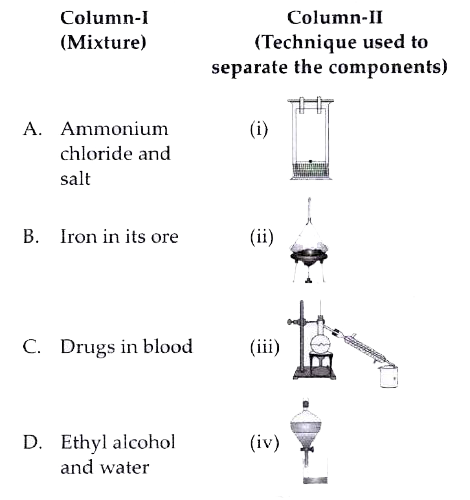
View Solution

